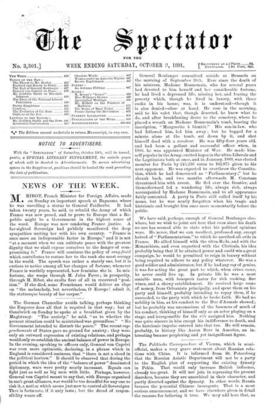General Boulanger committed suicide at Brussels on the morning of
September 30th. Ever since the death of his mistress, Madame Bonnemain, who for several years had devoted to him herself and her considerable fortune, he had lived a depressed life, missing her, and fearing the poverty which, though he lived in luxury, with three cooks in his house, was, it is understood—though it is also denied—close at hand. He rose in the morning, said to his valet that, though deserted, he knew what to do, and after breakfasting drove to the cemetery, where he placed a wreath on Madame Bonnemain's tomb, bearing the inscription, "Marguerite h bientot." His son-in-law, who had followed him, led him away ; but he begged for a minute alone at the tomb, sat down by it, and shot himself dead with a revolver. He was fifty-four years old, and had been a gallant and successful officer when, in 1886, he was appointed Minister of War. He made him- self popular in the Army, excited hopes in the ultra-Liberals and the Legitimists both at once, and in January, 1889, was elected member for Paris by 245,236 votes to 162,875 given to his next opponent. He was expected to overthrow the Constitu- tion, which he had denounced as " Parliamentary ;" but he shrank back, and two months afterwards M. Constans threatened him with arrest. He fled over the frontier, and thenceforward led a wandering life, always rich, always accompanied by Madame Bonnemain, and to all appearance fairly contented. A party in Paris still called itself by his name, but he was nearly forgotten when his tragic and histrionic end brought him once more momentarily before the public.


































